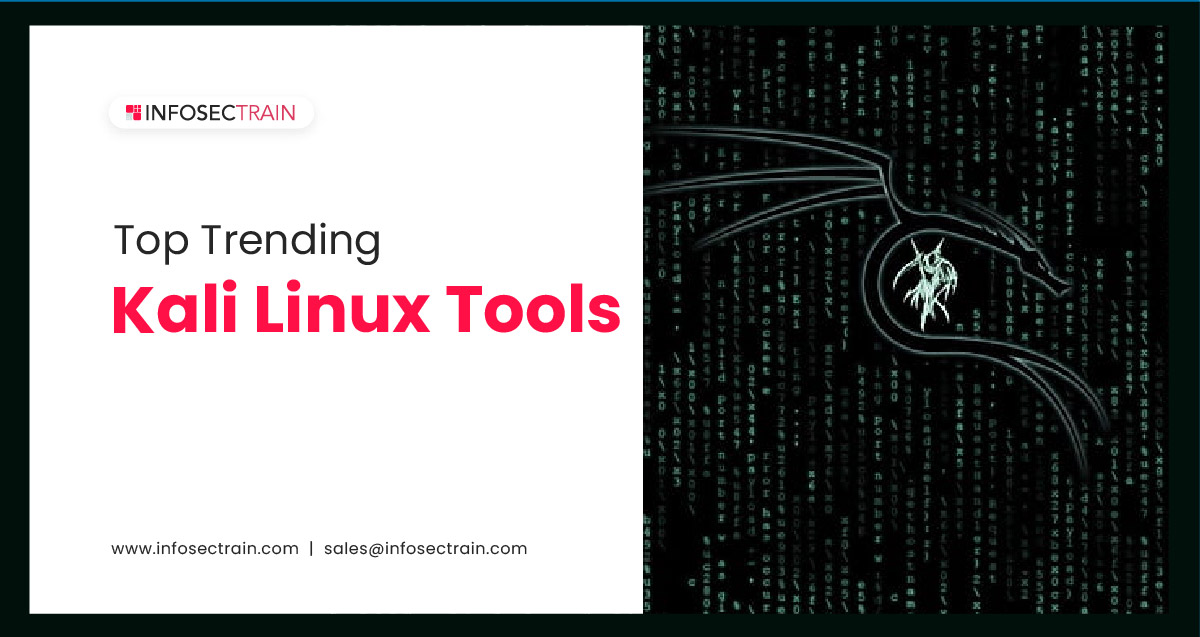Top Trending Kali Linux Tools
Kali Linux is a Debian-based Linux distribution intended for professionals and individuals familiar with Linux. It is a multi-platform solution with in-built tools used to perform various information security tasks such as penetration testing, red team testing, vulnerability management, security research, and so on. These Kali Linux tools are the best weapons for offensive security, especially for Network Analysts, Penetration Testers, Ethical Hackers, etc.

Since manually testing hundreds of conditions and payloads is tedious, we need to automate the process of hacking or testing to save time. Kali Linux tools save time, maintain reliable data, and provide accurate results. In this article, we are going to check out the top trending Kali Linux tools:
1. sqlmap
sqlmap is an open-source Kali Linux tool used in penetration testing to detect and exploit SQL injection vulnerabilities in databases. This tool automates the detection and exploitation of SQL injection processes and defends against them. sqlmap can support over six SQL injection techniques: Boolean-based blind, out-of-band, error-based, time-based blind, Stacker query, and Union query-based.
2. John the Ripper
John the Ripper is an open-source password-cracking tool used by cybersecurity professionals. It is used to crack passwords and detect the hash value if passwords are saved in a hash type rather than plaintext. John the Ripper helps to auto-detect the type of encryption on the hash data and compares it with the file consisting of possible passwords. It restricts the hashing process when it finds the match for the password and is used to perform dictionary attacks and brute force attacks on the system.
3. Aircrack-ng
Aircrack-ng is a complete suite of tools for assessing WiFi network security using various techniques to crack WPA/WPA2-PSK and WEP keys. This tool helps to monitor packet capture and export data to text files for processing. Aircrack-ng cracks the hashes through different attacks, such as dictionary attacks, deauthentication attacks, or fake access points.
4. Wireshark
Wireshark is a well-known Kali Linux tool, commonly referred to as a network sniffer used to capture and analyze packets. It is used for network analysis to analyze data packets; each packet includes network details such as transmit time, header data, protocol type, and source and destination IP address. The packet files have an extension of “.pcap,” and the .pcap files can be analyzed using Wireshark.
5. Metasploit Framework
Metasploit is an open-source penetration testing framework used to detect network or OS vulnerabilities that hackers can likely attack. It proactively recovers such vulnerabilities before being exploited by hackers. The Metasploit framework enables duplicate websites for phishing and other social engineering attacks. It detects vulnerabilities, manages security assessments, and enhances security awareness.
6. Nmap
Network Mapper (Nmap) is a most popular open-source and reconnaissance network security mapper used to identify services and hosts on the network by a network map. It provides advanced vulnerability detection and allows different scanning techniques, such as TCP, UDP, TCP connect, SYN half-open, and FTP. Nmap sends packets to the host and analyzes the response to generate accurate results. It is also used to detect operating systems, scan open ports, and host discovery.
7. Burp Suite
Burp Suite is one of the most widely used website security testing tools to intercept proxies and scan web applications and other functions. It helps test vulnerabilities like XSS, SQL injection, and other web vulnerabilities by sending a proxy request through the Burp Suite and allowing users to modify those requests as needed. Burp Suite contains various robust features that support both manual and automation testing.
8. Nikto
Nikto is also an open-source website vulnerability scanner used to detect vulnerabilities on the web server. It scans the web server and detects security vulnerabilities such as outdated server software, software misconfigurations, insecure file, default file name, and many more. Nikto can also support SSL (HTTPS) websites and saves reports in plain text, HTML, CSV, or XML file format.
9. Nessus
Nessus is a network vulnerability scanner that identifies and alerts the user when a vulnerability is detected. It uses Nessus Attack Scripting Language (NASL), a simple language to define individual threats and attacks. Nessus helps detect unidentified security patches and updates and identifies the attack surfaces in local and remote hosts. It also recommends the best possible ways to mitigate the vulnerabilities.
10. Lynis
Lynis is an open-source security auditing tool for system auditing, testing, hardening, and compliance testing. It can perform over 300 security tests on remote hosts, and this tool can scan for basic information about the system, configuration issues, and vulnerable softwares. Lynis supports multiple platforms such as Linux, AIX, macOS, and many more.
Become a cybersecurity expert proficient in Kali Linux tools with InfosecTrain
Cybercrime is rising with hackers using the latest tools and techniques, and the world requires highly-skilled cybersecurity experts who can work with similar tools and techniques and combat these threats. The demand for cybersecurity experts will continue to grow in the upcoming years, so it is one of the most lucrative career options available today. If you want to become one, InfosecTrain can assist you.
InfosecTrain is a well-known and reputed cybersecurity and information security training and consultancy firm. It offers instructor-led and expert-curated training on a wide range of cybersecurity certifications and domains. These courses will provide hands-on experience with Kali Linux tools, allowing you to master and use them effectively in real-world scenarios. You can enroll in our Cybersecurity Orientation Program and CompTIA Security+ training courses to learn the fundamentals of cybersecurity. To become a cybersecurity expert, check the various cybersecurity courses and choose the right career path.






